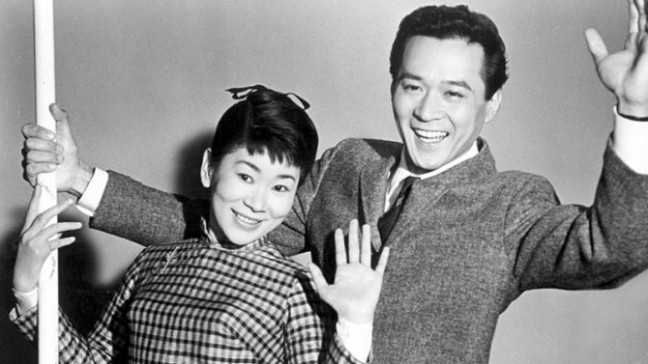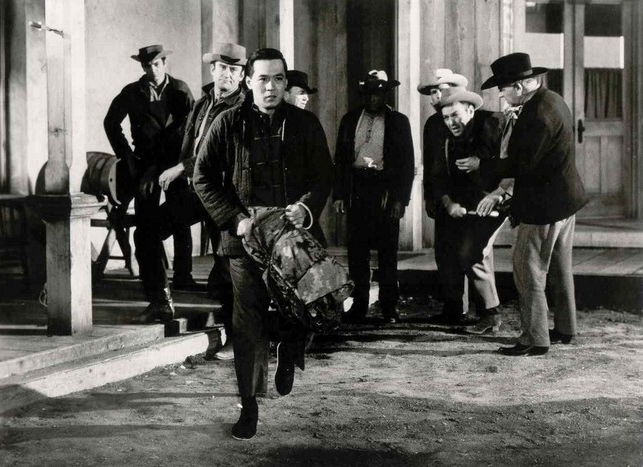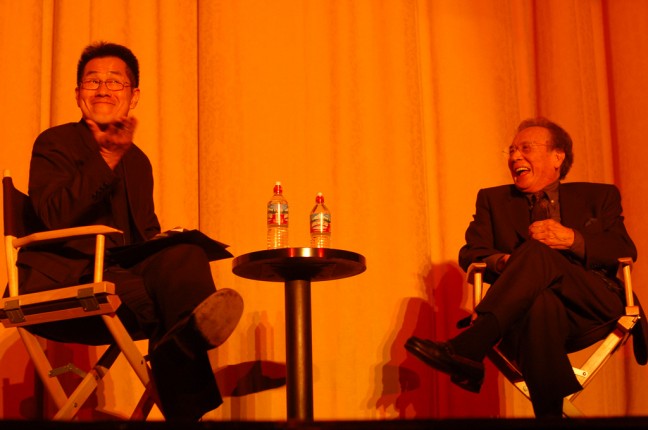We honored pioneering actor James Shigeta at the San Francisco International Asian American Film Festival in 2006. He was kind and good-natured as he graced the Castro Theatre stage after the screening of The Crimson Kimono. Shigeta passed away on Monday. He was 85. Today, we honor him again.

Tall, dark, handsome, and modest, James Shigeta is in the minds of many the embodiment of the modern Asian American male.
Born in 1929, the Nisei son of a Honolulu contractor, James Shigeta majored in English at New York University, with early career aspirations in teaching or writing. After a stint in the U.S. Marines during the Korean War, he first came into the limelight when he won national recognition on The Ted Mack Amateur Hour, (an early version of American Idol; other Ted Mack discoveries included Pat Boone and Ann-Margret). This led to headlining his own song-and-dance revue in Las Vegas, “Holiday in Japan.”
Hollywood at this time was still dominated by the major studios which had the machinery in place to discover and groom new talent for “stardom.” Las Vegas was emerging as the place to see talent on the hoof, as it were. He came to the attention of Paramount Pictures, and received an offer to appear in a Western to be directed by James Clavell, best known today for his cross-cultural novels Taipan and Shogun.
As is sometimes the case, while preparing for one film, Shigeta found work in another, The Crimson Kimono, written, produced, and directed by Samuel Fuller, that first-rate auteur of gritty tabloid noir films. Shigeta co-stars as Joe Kojaku, a Japanese American detective in Los Angeles who’s following a murder case in little Tokyo while involved in a bi-racial friendship-and-romance triangle with fellow cop Glenn Corbett and crime witness Victoria Shaw, respectively. Shigeta’s performance was focused and edgy, with a surprising degree of menace and restrained anger, earning him a Golden Globe as “New Star of the Year.”

Less than a year later, Clavell’s Walk Like a Dragon was released, a cross-cultural, East-meets-Western with Shigeta playing a Chinese immigrant caught up in a love-and-honor triangle with co-stars Jack Lord and Nobu McCarthy. Shigeta’s Cheng Lu is taciturn and proud, unwilling to play the passive coolie. Rarely screened today, Walk Like A Dragon is especially interesting for the way it uses the conventions of the Western to comment on contemporary attitudes.
Shigeta’s quintessential role was in the film version of Flower Drum Song (SFIAAFF `02), the paean to the promise of melting pot America. Playing the American-born son of an old-world Chinatown patriarch, Shigeta’s Wang Ta represents the emerging Asian American model minority, struggling to bridge two very different cultures. For Wang Ta, this dilemma is delightfully personified by Nancy Kwan and Miyoshi Umeki, with whom he sings, dances and romances. Blessed with a rich baritone, it certainly didn’t hurt Shigeta to have had a Rodgers and Hammerstein score to work with.
Appearing in three films in 1961, including Cry for Happy, with Glen Ford, and the aforementioned Flower Drum Song, Shigeta’s finest performance could be in Bridge to the Sun, opposite Carroll Baker. Directed by French director Etienne Perier, Bridge to the Sun was based on the best selling memoir by Gwen Terasaki, a Caucasian American who married a Japanese diplomat posted in the United States and returned with him to Japan after Pearl Harbor. As Hidenari “Terry” Terasaki, Shigeta had a terrific role in which to display his considerable romantic appeal, as well as the stoic heroism of a man of peace caught between warring states.
His later work includes Paradise, Hawaiian Style (as Elvis’ homeboy), Midway (1976), a brief but memorable role in Die Hard (1988), the voice of General Li in Disney’s animated feature Mulan (1998), and dozens of television guest appearances. The romantic lead roles that Shigeta appeared in during the early 60’s were afterwards rarely, if ever, offered to Asian American males.

This is an edited version of an essay by CAAM Executive Director Stephen Gong that originally appeared in the 24th annual San Francisco International Asian American Film Festival program guide. James Shigeta was the Spotlight honoree at the film festival in 2006. We screened three of Shigeta’s films that year: The Crimson Kimono, Walk Like a Dragon and Bridge to the Sun.
The Crimson Kimono (1959)
With his very first film, James Shigeta promptly whisked aside the collective humiliation of decades of Asian emasculation in Hollywood. Assured and dignified, his stereotype-shattering role in The Crimson Kimono was groundbreaking then and remains a rarity today—an Asian American man as a romantic lead. B-movie maestro Samuel Fuller embeds a provocative examination of interracial relationships into a noir detective narrative, delivered in his trademark tabloid style. Japanese American Joe Kojaku (Shigeta) and Caucasian Charlie Bancroft (Glenn Corbett) are detective partners and friends who share an apartment in L.A.’s Little Tokyo. While investigating the murder of a burlesque stripper, they meet a Caucasian artist, Christine (Victoria Shaw). Charlie falls for her first, but when it soon becomes apparent that she and Joe are falling for each other, the murder mystery plotline gives way to a surprisingly sophisticated love triangle, one beset by Charlie’s jealousy towards Joe, and Joe’s accusatory response of racism. Fuller’s exploration of race and racism was ahead of its time, and Christine’s choice between the two men—and the ensuing kiss—made celluloid history. —Taro Goto
Walk Like a Dragon (1960)
An intriguing East-meets-Western set in the 1870’s town of Jericho, a mythic un-melting pot of diverse types and ethnicities including an American hunk Linc Bartlett (Jack Lord), a French-Indian prostitute, a Mexican sheriff, and heathen Chinese: the coolie Cheng Lu (James Shigeta) and brothel chattel Kim Sung (Nobu McCarthy). Linc is opposed to slavery in any form and buys Sung in order to free her. He overcomes his chauvinism to eventually ask her to marry, a decision that challenges the color line and invokes the racist ire of the townspeople. Meanwhile, Cheng Lu is learning the hard lesson of the proud immigrant: survival depends on assuming a subservient manner, as well as a pidgin accent. He rebels, and challenges Linc to the ultimate test of American-style manhood: may the fastest draw win. Walk Like a Dragon reminds us how the Western, that most American of genre forms, reveals complex layers of motivation and meaning; what is shown here has more to do with the 1960’s and the cusp of the civil rights movement than with the 1870’s. —Stephen Gong
Bridge to the Sun (1961)
In what many regard as his finest performance, James Shigeta co-stars with Carroll Baker in this true story of a blonde belle from Tennessee who married a Japanese diplomat before World War II, then followed him to Japan after the attack on Pearl Harbor. Based on the autobiography of Gwen Terasaki, Bridge to the Sun chronicles her first encounter with Japanese diplomat Hidenari “Terry” Terasaki (Shigeta), their courtship against opposition from both sides, and their harrowing wartime experiences in Japan. Shigeta is at his cool and magnetic best as a key figure in trying to prevent war between Japan and the U.S., while Baker brings innocence and spunk to the role of a woman who stands by her husband through every imaginable cultural and political obstacle. Perhaps a Hollywood response to Hiroshima, Mon Amour (released just two years earlier), Bridge to the Sun reveals, via its interracial relationship, the rarely seen plight of Japanese civilians during the war, and stirred controversy upon its release for perceived anti-U.S. sentiments. That this film was made at all is as remarkable as the love story it depicts—a love that had every reason to fail, yet managed to persevere. —Taro Goto
These three film descriptions are edited versions of what appeared in the SFIAAFF ’06 program guide.
Main image: Still from Bridge to the Sun starring James Shigeta and Carroll Baker. Photo courtesy of Warner Bros. Pictures.
Correction: An earlier version stated that James Shigeta was born in 1933 and was 81 when he passed away, based on initial reports. The New York Times and other outlets have now reported that he was born in 1929 and was 85 when he passed.




